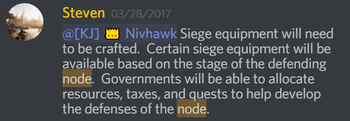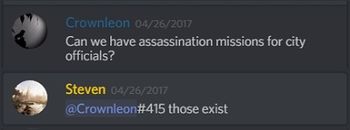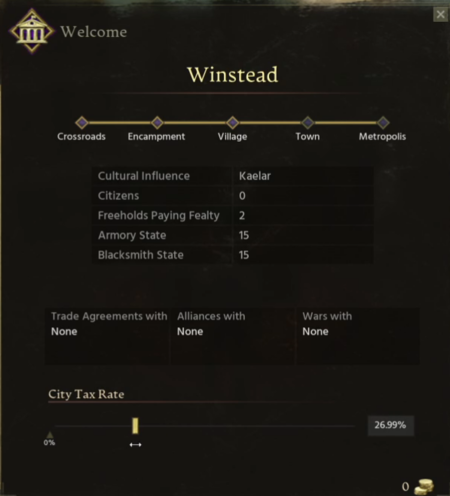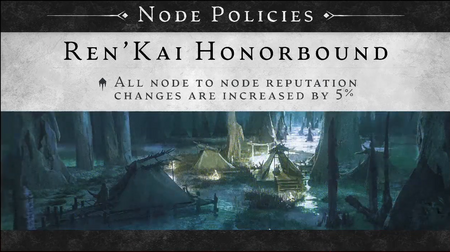Node policies

Nodes have a number of slots that they get to employ as Government policies that are enacted and chosen by the mayor and voted on by the people; and certain policies get unlocked by certain happiness states of the factions within the node; and those happiness states are predicated across different achievements that can happen in the world story arcs that get finished; bosses that get killed around you; new buildings that get constructed: Lots of different things can contribute to that happiness value: Number of citizens; number of citizens you've had leave; number of houses that might have been foreclosed upon. There's lots of different things that influence it, but when the happiness is met at a certain point- and even without that happiness you can still have policies that you get to enact regardless. You may choose policies that do certain things for the node; and this is a big strategic decision that the node has to almost agree on because it's voted on by the citizens within a short time period, but elected by the outstanding mayor; and when you deploy a policy it confers benefits to the citizens, or to the area, or to specific buildings, or to the mayor.[3] – Steven Sharif
Node policies affect a variety of node functions, such as taxes and fees, building and zone buffs, and node-to-node reputation activities, such as trade agreements, and node wars.[1][2]
- Maires propose node policies that are voted on by citizens within a 24-hour or shorter time period.[1][2][3][4]
- Policies are voted in if the majority of voters approve of them.[5]
- Mayors can utilize their available mandates to bypass policy votes.[1][2][6]
- Mayors may also be able to take emergency actions depending on certain predicates that get met. This might allow them to reduce the voting threshold or voting time for policies.[5][3]
- There are a limited number of policy slots available to be proposed.[1][2] Some policies occupy multiple slots.[3]
- Node policies that are deployed will provide benefits to various aspects of the node, its citizens, its ZI, its vassals (in some cases), specific buildings, and to its mayor.[5][3]
- Certain policies may affect the visual appearance of the node.[7]
- Some of the benefits you can receive by being a vassal of a certain parent is access to a policy that your node not might not normally have access to; and in fact you can also unlock an additional policy slot based on certain conditions that the parent or Sovereign node may have access to in their reliquary, or in their achievement systems, or in policies that they've elected. Some policies occupy multiple slots and it's almost like a card structure. You have each of these policies that live on a card and you get to select that card- throw it into the slot it goes out to the citizens to vote on within the 24-hour or sometimes shorter period. The mayor has emergency actions they can take right depending on certain predicates that get met and if an emergency action occurs they may be able to spend their influence as mayor within their term to set up a policy for a vote within an hour's period of time; and citizens in that way they can sneak it through a bit.[3] – Steven Sharif
Policies are unlocked by various conditions within a node.[1][2][3][4]
- Node level.[1][2]
- Node type.[1][2]
- Dominant node race.[1][2][3]
- Building choices.[1][2][3]
- Location of the node.[1][2]
- Evénements, such as node wars and node sieges.[5][1][2]
- Node happiness.[1][2][8][9]
- Succès based on the completion of story arcs.[3]
- Bosses d'extérieur that are defeated.[3]
- Citoyens de nœud gained (or lost).[3]
- Logement de noeud foreclosed upon.[3]
- There's a lot of different things that policies can influence; and policies exist within certain denominations. You have some policies that might be reflective of the culture that the node is representing; and you get access to those cultural policies. You have some policies that might become available because you've constructed a certain building type and now you've attracted a guild of NPCs that are weapons smiths. You might have some policies that are social organizations representative- you only get to build one social organization or Temple: which religion does the node follow. All of these are customization points that the city gets to choose and now you as a citizen get to identify the city that best aligns with your progression within the game and your game style and gameplay.[3] – Steven Sharif
Maires
Les Maires sont les dirigeants d'un Gouvernement de Nœud qui contrôle le développement de ce Nœud.[11]
- Alloue des Ressources, taxes, et des Quêtes pour aider au développement des défenses d'un Nœud.[12]
- Coordonne le transfert des ressources demandées avec les citoyens qui opéreront des Caravanes.[13]
- Les maires doivent communiquer sur quelles Ressources sont nécessaires pour un nœud en particulier puis doivent motiver les citoyens pour qu'ils remplissent ces besoins.[13]
- Autres pouvoirs de dirigeant.[11]
Seul des citoyens de nœud peuvent être élus maire.[14]
- Une seule citoyenneté peut être déclarée par Compte, par serveur.[14][15]
- Il est possible que cela ait été changé à une citoyenneté par compte.[16]
- Un roi ou une reine peut également devenir maire.[14]
Vous ne pouvez être citoyens que d'un seul nœud à la fois.[14] – Steven Sharif
Les Maires gagnent de nouveaux pouvoirs et responsabilités lorsque leur nœud avance.[17]
- Le titre de maire débloque des Compétences et des Statistiques spéciales pendant un siège de nœud ou pendant des Evénements.[18]
Mayoral leadership powers
Les élus du Gouvernement de Nœud ont une grande variété de Pouvoirs de dirigeant.[19]
- Déclarer des Guerres de Nœud contre un autre nœud et rallier les citoyens à leurs cause.[20]
- Signer des accords commerciaux.[20]
- Diriger des actifs.[22]
- Les Maires sont capables d'allouer des fonds de la trésorerie pour engager des Mercenaires PNJs pour défendre leurs Nœuds pendant des Sièges de Nœuds.[23][22]
- Les Maires sont capables d'initier des systèmes de quête auxquels les non citoyens peuvent participer. Le maire peut utiliser une portion de la trésorerie de son Nœud ou des produits en récompense pour la complétion d'une quête. Les joueurs seront en mesure d'interagir avec le nœud pour voir quelles quêtes ils peuvent entreprendre..[24]
- Ces quêtes peuvent être utilisées pour amener des Matériaux afin de combattre l'Atrophie de Nœud.[24]
Le gouvernement a beaucoup à dire sur la direction du développement d'un nœud. Diriger des actifs, constuire des projets, allouer des taxes, les compétences de défense etc. Les joueurs ont la possibilité non seulement de créer ces villes, mais ils ont le droit de les gouverner.[22]
Il existe des leviers et des boutons de réglages qui sont présents pour les propriétaires de Châteaux ainsi que pour les élus d'un nœud que pendant leur mandats ils ont la possibilité d'impacter et d'influencer les régions autour d'eux.[27] – Steven Sharif
Les Guildes ne contrôles pas les Nœuds.[28][29] Les Chefs de guildes (Rois et Reines) peuvent devenir des Maires de nœud.[14]
- Les guildes tiennent un rôle séparé dans la direction d'un nœud que celui tenu par les citoyens privés.[22]
- Seulement un certain nombre de guildes peuvent participer à ces rôles.[22]
- Certains rôles de guilde sont séparés pour les petites, moyennes et larges guildes.[22]
Les guildes tiennent également un rôle séparé dans la direction d'un nœud, différent du rôle tenu par les citoyens privés, seulement un certain nombre de guildes peuvent participer à ces rôles. Certains rôles de guilde sont séparés pour les petites tailles, moyennes tailles et larges tailles de guildes.[22]
Node-to-node reputation
Node-to-node reputation activities include trade agreements and wars between nodes.[1][2]
- Completing mayoral commissions will reward node-to-node reputation.[1][30]
Trade agreements
Maires can enter into trade agreements with other nodes to facilitate trade between the nodes.[31][32][20]
- There are a limited number of trade agreements that a node can have.[31]
- Mayoral caravans may only be initiated between nodes with trade agreements or alliances.[31][32]
- Trade agreements affect reputation between the nodes.[1][2]
- Mercenary guilds will be a viable way forward for different organizations. I think there will be a lot of business to be had with that; and one of the systems in our trade agreements is creating an escrow for those particular type of arrangements that we're looking into.[33] – Steven Sharif
Guerres de Nœud
Le Gouvernement de Nœud peut déclarer des Guerres de Nœud contre un autre Nœud et rallier les citoyens à sa cause.[20]
- Cela activera le mode JcJ des citoyens des nœuds en guerre, incluant également les membres de leurs Alliances, et les considère comme des combattants.[34]
- Les Quêtes provenant des Organisations sociales seront soit coopérative soit compétitive en fonction du statut de guerre de leurs nœuds parent.[34]
- Les Nœuds Vassaux peuvent pas déclarer des Guerres de Nœud à leurs nœuds parent ou à leurs vassaux.[17]
Nous avons des conditions que vous pouvez activer entre les nœuds concernant les rapports soit amicaux ou commerciaux avec ce nœud, ou ils peuvent se déclarer la guerre un peu comme une guerre de guilde fonctionnerait dans d'autres jeux, où les citoyens deviennent hostile entre eux en fonction du gouvernement élu par les joueurs dans ces nœuds. Donc ces systèmes servent tous plus ou moins à créer des conflits qui sont importants et qui fourni également une relation équilibrée entre des guildes fortes et des guildes moins fortes.[35] – Steven Sharif
Visuels
Voir également
Les références
- ↑ 1.00 1.01 1.02 1.03 1.04 1.05 1.06 1.07 1.08 1.09 1.10 1.11 1.12 1.13 1.14 1.15 Blog: Development Update with Village Node.
- ↑ 2.00 2.01 2.02 2.03 2.04 2.05 2.06 2.07 2.08 2.09 2.10 2.11 2.12 2.13 2.14 Direct, 2023-08-31 (44:21).
- ↑ 3.00 3.01 3.02 3.03 3.04 3.05 3.06 3.07 3.08 3.09 3.10 3.11 3.12 3.13 3.14 3.15 Direct, 2022-08-26 (1:12:40).
- ↑ 4.0 4.1 Direct, 2022-04-29 (27:42).
- ↑ 5.0 5.1 5.2 5.3 Direct, 2023-08-31 (47:43).
- ↑ Direct, 2023-08-31 (31:44).
- ↑ Direct, 2023-08-31 (49:13).
- ↑ 8.0 8.1 Direct, 2023-04-07 (1:19:41).
- ↑ 9.0 9.1 Direct, 2022-08-26 (1:17:04).
- ↑ Direct, 2018-12-12 (14:48).
- ↑ 11.0 11.1 Direct, 2017-11-17 (9:49).
- ↑

- ↑ 13.0 13.1 Direct, 2017-06-30 (53:57).
- ↑ 14.0 14.1 14.2 14.3 14.4

- ↑ Entrevue, 2018-05-11 (50:05).
- ↑ Entrevue, 2018-10-20 (2:36).
- ↑ 17.0 17.1 Blog - Know Your Nodes - The Basics.
- ↑ Direct, 2020-07-25 (1:52:45).
- ↑

- ↑ 20.0 20.1 20.2 20.3 20.4 City hall.
- ↑

- ↑ 22.0 22.1 22.2 22.3 22.4 22.5 22.6 22.7 22.8 MMOGames interview, January 2017
- ↑ Direct, 2020-06-26 (59:11).
- ↑ 24.0 24.1 Entrevue, 2020-07-08 (1:04:05).
- ↑

- ↑ Direct, 2017-05-19 (36:05).
- ↑ Entrevue, 2018-05-11 (47:27).
- ↑ Direct, 2017-05-19 (36:09).
- ↑
- ↑ Direct, 2023-08-31 (39:17).
- ↑ 31.0 31.1 31.2 Direct, 2023-08-31 (2:10:23).
- ↑ 32.0 32.1 Vidéo, 2019-07-15 (2:12).
- ↑ Direct, 2018-04-8 (AM) (18:59).
- ↑ 34.0 34.1 Entrevue, 2020-07-19 (24:34).
- ↑ Vidéo, 2018-04-05 (41:48).








